In Montessori books and articles, you might come across a discussion of the origins of the philosophy. Dr. Montessori‘s passion for educating children with disabilities and additional learning needs is at the core of the development of her system, which went on to revolutionize education as we know it. In more recent times, the focus has definitely moved away from children with additional needs. In this article I will discuss the question, Montessori and Special Needs, can it work?
“Following the child” is one of the fundamental pillars of the philosophy and stands as a guiding principle for many parents and teachers who want to successfully integrate Montessori ideas into the lives of their children.
So how do Montessori ideas apply in a home or classroom setting where young people may have additional needs?
Montessori and special needs children: Can it work?
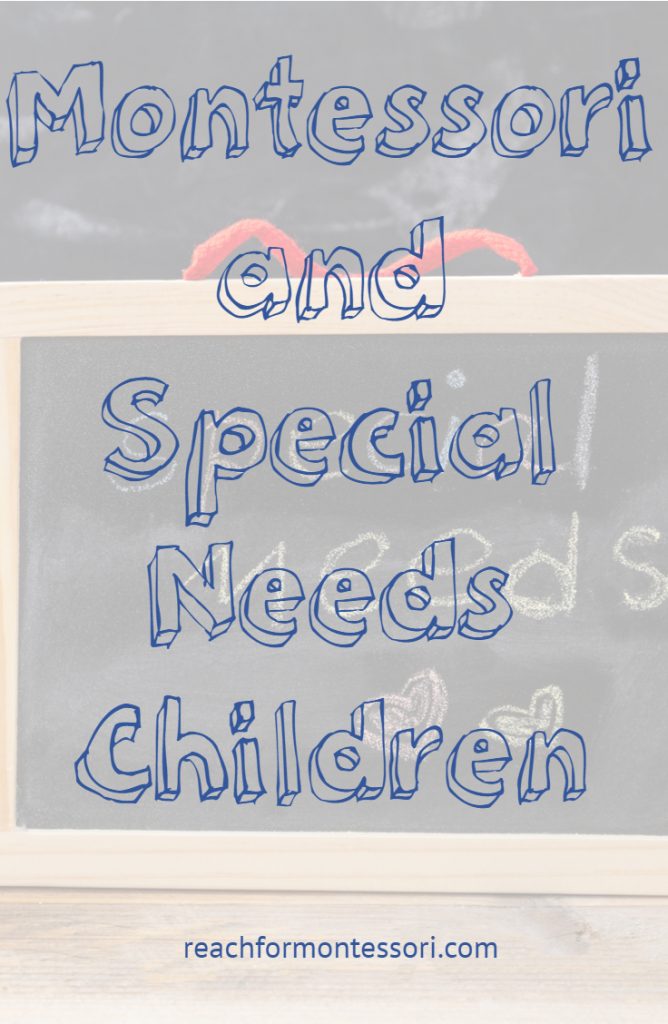
In my experience as a special needs teacher, and as a mother of a child with additional needs, there are a myriad of ways that the Montessori philosophy can be applied. Some of it requires a bit of extra thinking, but we're not afraid of that, right?
So let's break it down…
The Environment
Firstly, it is fundamental to making sure the children are able to access everything they require for as much independence as possible. This speaks to the concept of the “Prepared Environment” which is intrinsic in Montessori.
In a special needs classroom or home, this might look like access to communication devices, augmentative and alternative communication (AAC) boards, or specialty equipment for sitting, writing, reading or moving. The tools of the trade, if you will.
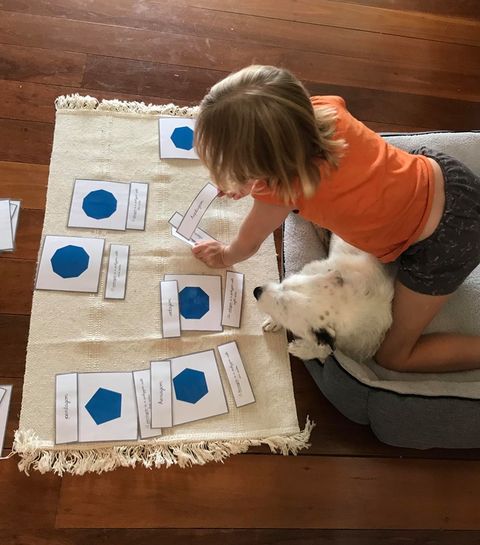
A simple example of this might be found in many classrooms and homes- child sized furniture and varied seating. For a child with mobility issues, that will be a game changer, just being able to navigate the classroom or home, and sit them self down to work independently, even on the floor!
I know that has been a huge benefit to our small person, who really prefers to work on the floor than anywhere (sometimes with the dog!)
Another example would be something more specific, such as a communication book or iPad which is set up and functioning, so that the child is able to access the programs they want, communicate their opinions and needs, just like any other student.
This is vital.
This is their voice. We must always ensure that children have access to communication, in whatever form that takes for them. That is how they express desires, choices, argue, joke, play, state preferences and interact with their world.
The Materials
The traditional materials that we all know and love were originally developed to be hands on, to be engaging for children who needed something concrete to begin their learning. This has been widened to any and all children, but what a wonderful way to make a classroom inclusive!
The materials are the same for everyone, are accessible to everyone and help everyone, including those who ordinarily needed a bit of extra assistance to grasp a learning topic. A vastly different situation to a mainstream classroom where a child with additional needs is often given completely different work.
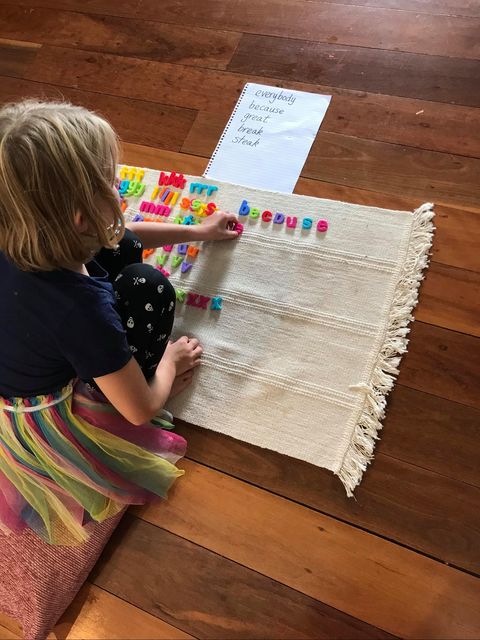
Montessori and special needs work particularly well together because of the specifically designed materials, due to their hands on aspects and their sensory aspects. These were all revolutionary when Dr. Montessori invented them, but now, we accept that all children (especially special needs ones) benefit greatly from sensory integration and practical hands on equipment.
Compare learning letter shapes by trying to write on paper, to tracing sandpaper letters! For a child with motor skill difficulties, having access to a movable alphabet is a revolution! In a special needs classroom, it is not unusual to come across “alternative pencils” and the movable alphabet is just that.
It is also worth noting that while Montessori is divided in planes that the children move through. In Montessori and special needs children, it might be observed that they remain longer in one plane, or aspects of a plane of development.
This is all just part of the personalization that makes Montessori such a wonderful philosophy for working with special needs kids! They can take their time, they can revisit and repeat, they can build slowly over time as they need to, at their own pace.
Practical Life
One aspect of Montessori that is a huge benefit to special needs children is Practical Life learning. One of the major goals for many children with additional needs is independent living.
This is not always possible for every child, but every step on the ladder is of huge benefit. As Montessori educators and parents, it is a great way to offer confidence and develop skills they will use throughout their life.
This is not an aspect you would necessarily come across in a mainstream school.
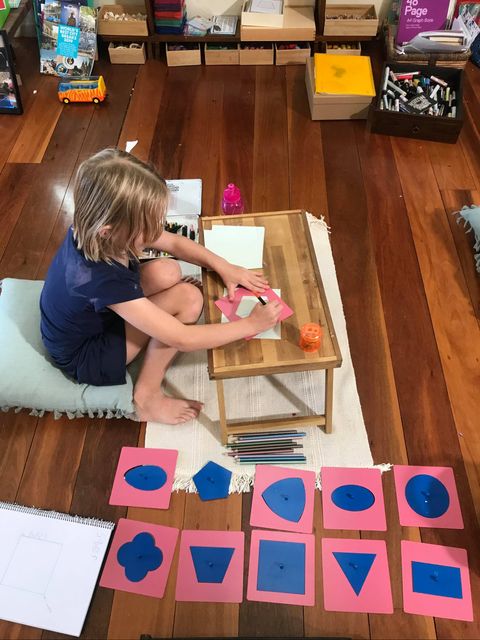
Many times, it can be about more about our assumptions! Sometimes parents and educators default to doing things for their children.
Maybe they think it is kindness, maybe they are worried the children will find it too hard, but in my experience, special needs children take great pride and pleasure in being able to look after themselves. This might look like simply learning to pour a glass of water for themselves, with a child sized glass jug.
It might look like sweeping or wiping. These are all skills that are needed, and hugely important. In a Montessori environment, that behavior is specifically taught and celebrated as part of their learning.
Praise
Generally, in a Montessori environment adults are discouraged from offering praise. I am the first to admit that in special needs classrooms, we over praise.
This comes from a belief that student with special needs have a lower intrinsic motivation, and that is true of some kids. My daughter is someone who looks to adult attention for validation of her work and choices.
So how do we make this work for a Montessori special needs child?
In my experience there are a couple of easy ways around it, to avoid praise becoming a control method, as unfortunately some special needs environments rely on praised and stickers etc to encourage “desired” behaviors.
So instead of the constantly overused (I do it too, believe me!) “Great job!“
Try, “You did it!” as a simple example.
Another one I like to apply is “YAY!” which is just a statement of joy.
For other children, a specific explanation of why what they did was “good” is really effective, as they genuinely might not understand why you're seeking that behavior. For example, “Thank you for helping tidy up, now the room is clean for us all to play!“
“Thank you” is a really powerful phrase, offering respect to the child and acknowledging what they have done, as well as teaching grace and courtesy.
Independence
Maria Montessori believed that children were capable of doing so much more than many adults would believe. She didn't assume that this would be the case if we just left them to it.
There are carefully crafted aspects of the philosophy that ensure that independence. With our children with additional needs, those aspects might look a little different, but they are all doing the same job. They are giving our kids the gift of independence and guiding them through learning every step of the way.
In Montessori, learning how to live, how people interact and learning peace are all part of the school or home education. Learning about yourself, so that as an adult you know what you need to get by successfully is at the heart of it all.
Many children with special needs will not fully be able to work independently as a child without difficulties might.
So, can Montessori with special needs really work?
For a mainstream child in a Montessori classroom, they may set up a work plan, choose their activities from the shelves, attend to them for long stretches of time and clean up after themselves, all without adult intervention. For a child who has additional needs, fostering independence is a slower path, but not an impossible one.
In my experience with special needs pupils, everyone is capable of making a choice, given the right communication methods. Everyone can have a preference. Everyone can work on something that grabs their interest.
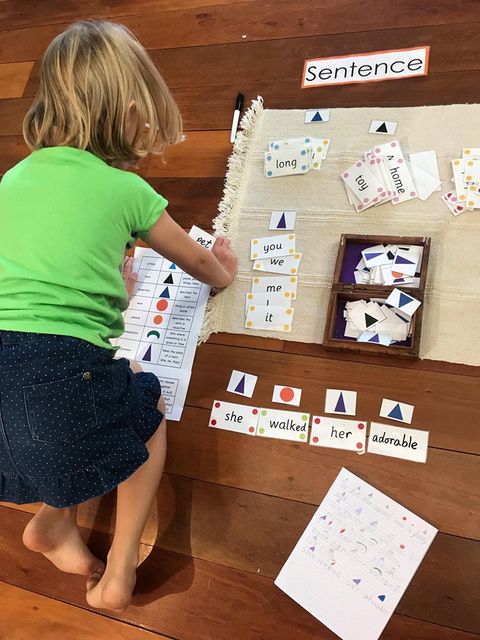
When we subscribe to the Montessori philosophy, we are agreeing to follow not only the needs of the child, but their interests as well. This is exactly what we do in a special needs environment.
If your child is fascinated with something (some wonderful examples from my experience include kingfishers, the London tube map, leopards and Godzilla) as a teacher and guide, you shape the learning experience to embrace and celebrate that fascination.
The student might need a modified version of the traditional method, but they can access and enjoy learning the Montessori way! A child with special needs might require fewer choices, or a guide to assist the planning of their work.
They might not have the capacity to initially work in long stretches of concentrated effort, but at the core of this whole thing is our desire to help children to learn, we want to give them whatever they need to achieve that goal.
So if that means shaping things a little differently for a small person, then why not?
When Dr. Montessori walked into a room and saw children with disabilities left to play with nothing but breadcrumbs and not educated at all, I believe that her goal was to find a way to engage them, captivate them, excite them and let them thrive!
Adhering strictly to a three hour work cycle with limited adult interaction may be the ideal for a mainstream Montessori student, but for a child with special needs, there may be a greater need for adult interaction, for guidance and support.
But to me, that's what the philosophy is, at its heart. It's about supporting a child to learn in ways that work.
So, let's strive to make it work!
